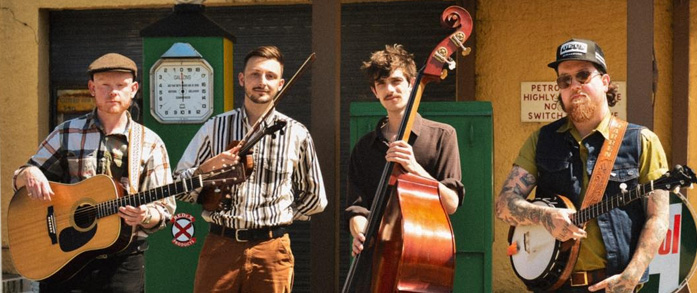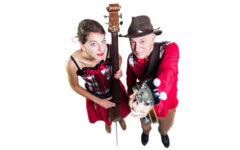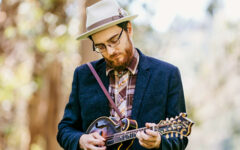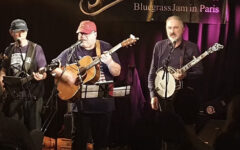
While Welsh is a decidedly different language from the English spoken throughout the rest of the UK, and in the US, music serves as a common connection. Taff Rapids, a bluegrass band hailing from Cardiff in Wales, has proven that point courtesy of their unique blend of bluegrass and its rich traditions. Comprised of seasoned musicians Darren Eedens on banjo, Sion Russell Jones on guitar, David Grubb on fiddle, and Clem Saynor on double bass, the quartet brings a fresh perspective, courtesy of the infusion of their Celtic influences into a style which they refer to as “Blŵgras.”
“We started this band initially as a way to see more bluegrass in Cardiff,” Eedens explains. “I am originally from Canada, and I loved how many bluegrass/country gigs there were to attend in Toronto where I lived. I felt like the Welsh capital needed something similar. So thanks to a friend who ran a pub called Bubs, we were able to start Cardiff’s first bluegrass brunch. We cut our teeth while folks had their bacon and eggs. I had met Dave in a jam years prior, and after a call out on Facebook, Sion was quickly brought around for a jam. We started as a trio, later bringing Clem into the picture and completing the vocals and the instrumentation. We were doing three sets every Sunday very shortly after starting the band, and this gave us the chance – I.e. forced us — to build up a repertoire quickly. As we are all songwriters, we then had the chance to start testing out new originals, concepts, and directions for our sound. Those early days really got the ball rolling and shaped us.”
Eedens goes on to liken their sound to a transatlantic session. “We bring our very different influences together, combining the traditions of Welsh/Celtic music and bluegrass,” he continues. “We quickly realized the similarities between those styles, and found the room to adapt many Welsh traditional fiddle tunes. As we started building up our set, and giving tunes our own spin, we started incorporating the Welsh language. We knew we had a special side to this project, and soon after we took on the term ‘Blŵgras’ as our description of the genre. It’s just like bluegrass, but a bit more Welsh and a bit more our own.”
That’s not to say the band hasn’t dabbled in other forms of musical expression as well. “We’ve all written and performed in such a wide range of styles, from jazz to country, pop to Scottish folk, indie rock and classical,” Eedens said. “I think that once we started to let our guard down, all these things came together in a way that really created a variety in the sound of our music.”
According to Eedens, there was plenty of variety in their musical upbringing, especially as far as their early influences were concerned.
“We all come from very different musical backgrounds, which I think has helped us develop our sound,” he noted. “In bluegrass, we spent a lot of time listening to the greats, ranging in different eras, like Flatt & Scruggs, The Bluegrass Album Band, Tony Rice, Bela Fleck, Molly Tuttle, Punch Brothers, Michael Cleveland, and Billy Strings, to just to name a few. We’ve taken much time analyzing every lick they play, much like everyone does. We love that there is always something to learn, even with a song you’ve known for years. The recordings and players out there today are doing so many great things, so that every time you put on a record, there is inspiration and influence. We have listened to Bluegrass ’95 so many times, we might be wearing the album out!”
Nevertheless, their efforts have clearly paid off. In 2023, Taff Rapids was invited to perform at the IBMA World of Bluegrass Showcase, marking a significant milestone. That was followed by a successful Canadian tour. Meanwhile, their compelling live performances, replete with rich harmonies and instrumental acumen, continue to attract audiences across the UK and Europe.
In addition, they’ve garnered regular radio play on BBC Radio, live performances on BBC Radio Cymru, and features on BBC S4C television. In the coming months, another Canadian tour is planned, including an appearance at Folk Alliance International in Montreal.
Their other festival appearances have included La Roche Bluegrass in France, UK bluegrass festivals such as Gower Bluegrass, Didmarton Bluegrass, and Battlefield Bluegrass, as well as various non-bluegrass gatherings. Their festival plans in 2025 include Focus Wales, Rotterdam Bluegrass, Bluegrass Festival Bühl, and Festival Interceltique de Lorient, which Eedens cites as the largest Celtic festival in the world.
“We still maintain a local monthly residency at the brewery bar Tiny Rebel in Cardiff City Centre, while maintaining our original goal of the band…which is to share more bluegrass,” Eedens said. “But we are also regularly out on the road. We have multiple tours booked that will take us places like France, Belgium, Netherlands, Germany, and Switzerland in the coming months. We will be pushing our album throughout the year, starting with a sold-out show here in Cardiff, and ending the year with a UK-wide tour.”
The album he refers to is due in March, and titled, naturally enough, Blŵgras. “We perform a musical mix,” Eedens insists. “Some shows are entirely originals, and our residencies consist mainly of traditional tunes and covers. The album consists almost entirely of originals, sung in both English and Welsh with a special Welsh trad track in there titled Dacw ‘Nghariad. Often what we do is blend Welsh traditional music with better known American fiddle tunes. Some of our favorites include Cherokee Shuffle, Jerusalem Ridge, and Monroe’s Hornpipe. But we also throw in some singing, with favorites like Big Spike Hammer, Tennessee Waltz, June Apple, etcetera. We keep swapping out and adding new ones, and our monthly gig is a good way to do it! We regularly do two sets, so given a full album and a good size back catalogue, we have a lot of variety, and we’re able to change the set up often.”
Happily then, the band has been well received.
“It’s been quite wild to see the response to our brand of bluegrass,” Eedens added. “I think the Welsh language element has really brought Welsh speakers to our music. People love Wales, and they love bluegrass, so bringing those two things together has been a lot of fun, and I think that’s attracted people to it.… particularly when we have taken a slow choir-style traditional song, and turned it into an upbeat singalong with fiddle solos and barn burning. Everyone knows the words, but they’ve never heard them like we do it. I also think it has shown a lot of people here what bluegrass is all about. We often have people who have never heard a banjo tune before, but when they stumble across our residency, they stay for the whole show.”
Consequently, Taff Rapids has ignited a lot of interest. “We have this strong support,” Eedens said. “Our fans seem to be just as excited for our travels as we are, and they show great support by sporting Blŵgras tee-shirts, and spreading the word. We have literally shown up to play a bar in Canada, and have groups of Welsh people come out because their family, which lived in Wales, has told them to come!”
In that regard, Eedens has no doubt as to why bluegrass enjoys such widespread popularity.
“There is something about bluegrass, and I almost wonder if it can be described,” he suggests. “I can remember the first time I heard it — the drive, the pulse, the feeling, and the power of the acoustic music and vocals. I think that’s one of those things where people don’t just like it, but truly fall in love with it as well. For us, it is also a source of endless learning — the way the new players are pushing the boundaries and the way you can always find something new in someone else’s version of a piece. That way, you never get tired of it.”
There’s more to it as well, he said. “I think it also has such a strong sense of community, from the culture of jamming to everyone being on the same level,” Eedens continued. “It’s much like jamming in pubs here, where we often just practice sitting around a table in a local pub. It truly crosses culture and language. We can just sit and pick together, regardless of where we are from. I think that regardless of age, people could have listened to the music their whole lives and then decide they want to try and be a part of that. Then they learn to play an instrument… it is truly something to be a part of in a way that I think is truly special with bluegrass music…and we are grateful to be a part of it too.”







